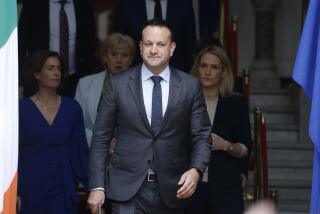Ex-Prime Minister Major Won’t Seek Reelection to British Parliament
- Share via
LONDON — Former Tory Prime Minister John Major, who led Britain’s government from 1990 to 1997, said Friday that he has decided not to run for Parliament in the next general election.
In a letter to the Huntingdon Conservative Assn., the 56-year-old Major said he had made his decision not to run after “a great deal of soul-searching and sadness.”
“I would rather go while I am being urged to stay, rather than stay beyond the time when I should go,” he said.
Major became prime minister in 1990, succeeding Margaret Thatcher, and was soon dubbed “The Man Who Came to Dither” because of his lackluster style.
Major shone during the 1992 general election, however, leading the conservatives to victory, denouncing right-wingers in his Cabinet and facing up to Euro-skeptic members of his party.
In 1995, in the face of internal party turmoil, Major resigned and threw down the gauntlet to all challengers. In the end, he retained the party leadership.
Victory was short-lived.
The Tories never recovered from allegations of sleaze and financial corruption, and Major led the Conservative Party--which governed Britain for 18 years--to its disastrous defeat in May 1997.
Major will perhaps be best remembered for the advances he made toward Northern Ireland peace, paving the way for the Good Friday accord of 1998.
That agreement designed the local power-sharing government that gave the province partial home rule briefly this winter.
Former Irish Prime Minister Albert Reynolds, who worked with Major on the peace process, described him as a “great public servant.”
“He was crucial in helping to build the peace process. He worked very hard and genuinely wanted to make it succeed,” Reynolds said.
Major reportedly has told friends that he has not decided what to do professionally after he leaves government.
“I have served in Parliament for over 20 years and politics has been an important part of my life for far longer, but it is not all my life and it is time to enjoy the many other aspects that have been subordinated over so many years,” Major said in his letter.
“My family has sacrificed much for politics, and it is now time for politics to make way,” he said.
Tory leader William Hague said the party was saddened to hear of Major’s decision.
“As prime minister for seven years, he will be remembered for the golden economic legacy from which we are still benefiting . . . and for his tireless efforts and determination to bring peace to Northern Ireland, which laid the foundations for the Good Friday agreement,” Hague said.
“For these things and many others, the country owes him a considerable debt.”
Keith Stukins, chairman of the Huntingdon Conservative Assn., said Major’s decision would come as “an enormous shock” to members of the constituency.
More to Read
Sign up for Essential California
The most important California stories and recommendations in your inbox every morning.
You may occasionally receive promotional content from the Los Angeles Times.













